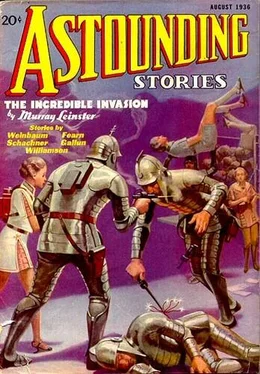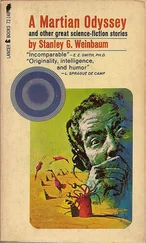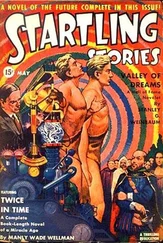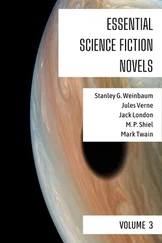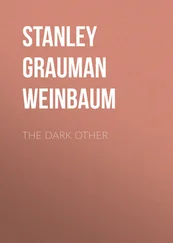Stanley Weinbaum - Proteus Island
Здесь есть возможность читать онлайн «Stanley Weinbaum - Proteus Island» весь текст электронной книги совершенно бесплатно (целиком полную версию без сокращений). В некоторых случаях можно слушать аудио, скачать через торрент в формате fb2 и присутствует краткое содержание. Жанр: Фантастика и фэнтези, на английском языке. Описание произведения, (предисловие) а так же отзывы посетителей доступны на портале библиотеки ЛибКат.
- Название:Proteus Island
- Автор:
- Жанр:
- Год:неизвестен
- ISBN:нет данных
- Рейтинг книги:3 / 5. Голосов: 1
-
Избранное:Добавить в избранное
- Отзывы:
-
Ваша оценка:
- 60
- 1
- 2
- 3
- 4
- 5
Proteus Island: краткое содержание, описание и аннотация
Предлагаем к чтению аннотацию, описание, краткое содержание или предисловие (зависит от того, что написал сам автор книги «Proteus Island»). Если вы не нашли необходимую информацию о книге — напишите в комментариях, мы постараемся отыскать её.
Proteus Island — читать онлайн бесплатно полную книгу (весь текст) целиком
Ниже представлен текст книги, разбитый по страницам. Система сохранения места последней прочитанной страницы, позволяет с удобством читать онлайн бесплатно книгу «Proteus Island», без необходимости каждый раз заново искать на чём Вы остановились. Поставьте закладку, и сможете в любой момент перейти на страницу, на которой закончили чтение.
Интервал:
Закладка:
Did it, indeed? He frowned as sudden remembrance struck him. What of the wild, yellow-eyed imp that had snarled at him from the brookside? He had forgotten that in the excitement of the desertion of Kolu and Malloa. That was certainly neither bat, rat, nor dog. What was it?
Still frowning, he felt his gun, glancing to assure himself of its readiness The two Maoris might have been frightened away by an imaginary menace, but the thing by the brook was something he could not ascribe to superstition. He had seen that. He frowned more deeply as he recalled the tailed bat of earlier in the preceding evening. That was no native fancy either.
He strode toward the fern forest. Suppose Austin Island did harbor a few mutants, freaks, and individual species. What of it? So much the better; it justified the Fortune expedition. It might contribute to the fame of one Alan Carver, zoologist, if he were the first to report this strange, insular animal world. And yet — it was queer that Mawson had said nothing of it, nor had the whalers.
At the edge of the forest he stopped short. Suddenly he perceived what was responsible for its aspect of queerness. He saw what Malloa had meant when he gestured toward the trees. He gazed incredulously, peering from tree to tree. It was true. There were no related species. There were no two trees alike. Not two alike. Each was individual in leaf, bark, stem. There were no two the same. No two trees were alike!
But that was impossible. Botanist or not, he knew the impossibility of it. It was all the more impossible on a remote islet where inbreeding must of necessity take place. The living forms might differ from those of other islands, but not from each other — at least, not in such incredible profusion. The number of species must be limited by the very intensity of competition on an island. Must be!
Carver stepped back a half dozen paces, surveying the forest wall. It was true. There were ferns innumerable; there were pines; there were deciduous trees — but there were, in the hundred yard stretch he could scan accurately, no two alike! No two, even, with enough similarity to be assigned to the same species, perhaps not even to the same genus.
He stood frozen in uncomprehending bewilderment. What was the meaning of it? What was the origin of this unnatural plenitude of species and genera? How could any one of the numberless forms reproduce unless there were somewhere others of its kind to fertilize it? It was true, of course, that blossoms on the same tree could cross-fertilize each other, but where, then, were the offspring? It is a fundamental aspect of nature that from acorns spring oaks, and from kauri cones spring kauri pines.
In utter perplexity, he turned along the beach, edging away from the wash of the waves into which he had almost backed. The solid wall of forest was immobile save where the sea breeze ruffled its leaves, but all that Carver saw was the unbelievable variety of those leaves. Nowhere — nowhere — was there a single tree that resembled any he had seen before.
There were compound leaves, and digitate, palmate, cordate, acuminate, bipinnate, and ensiform ones. There were specimens of every variety he could name, and even a zoologist can name a number if he has worked with a botanist like Halburton. But there were no specimens that looked as if they might be related, however distantly, to any one of the others. It was as if, on Austin Island, the walls between the genera had dissolved, and only the grand divisions remained.
Carver had covered nearly a mile along the beach before the pangs of hunger recalled his original mission to his mind. He had to have food of some sort, animal or vegetable. With a feeling of distinct relief, he eyed the beach birds quarreling raucously up and down the sand; at least, they were perfectly normal representatives of the genus Larus. But they made, at best, but tough and oily fare, and his glance returned again to the mysterious woodlands.
He saw now a trail or path, or perhaps just a chance thinning of the vegetation along a subsoil ridge of rock, that led into the green shades, slanting toward the forested hill at the western end of the island. That offered the first convenient means of penetration he had encountered, and in a moment he was slipping through the dusky aisle, watching sharply for either fruit or bird.
He saw fruit in plenty. Many of the trees bore globes and ovoids of various sizes, but the difficulty, so far as Carver was concerned, was that he saw none he could recognize as edible. He dared not chance biting into some poisonous variety, and Heaven alone knew what wild and deadly alkaloids this queer island might produce.
Birds fluttered and called in the branches, but for the moment he saw none large enough to warrant a bullet. And besides, another queer fact had caught his attention; he noticed that the farther he proceeded from the sea, the more bizarre became the infinite forms of the trees of the forest. Along the beach he had been able at least to assign an individual growth to its family, if not its genus, but here even those distinctions began to vanish.
He knew why. "The coastal growths are crossed with strays from other islands," he muttered. "But in here they've run wild. The whole island's run wild."
The movement of a dark mass against the leaf-sprinkled sky caught his attention. A bird? If it were, it was a much larger one than the inconsiderable passerine songsters that fluttered about him. He raised his revolver carefully, and fired.
The weird forest echoed to the report. A body large as a duck crashed with a long, strange cry, thrashed briefly among the grasses of the forest floor, and was still. Carver hurried forward to stare in perplexity at his victim.
It was not a bird. It was a climbing creature of some sort, armed with viciously sharp claws and wicked, needle-pointed white teeth in a triangular little red mouth. It resembled quite closely a small dog — if one could imagine a tree-climbing dog — and for a moment Carver froze in surprise at the thought that he had inadvertently shot somebody's mongrel terrier, or at least some specimen of Canis.
But the creature was no dog. Even disregarding its plunge from the treetops, Carver could see that. The retractile claws, five on the forefeet, four on the hind, were evidence enough, but stronger still was the evidence of those needle teeth. This was one of the Felidae. He could see further proof in the yellow, slitted eyes that glared at him in moribund hate, to lose their fire now in death. This was no dog, but a cat!
His mind flashed to that other apparition on the bank of the stream. That had borne a wild aspect of feline nature, too. What was the meaning of it? Cats that looked like monkeys; cats that looked like dogs!
He had lost his hunger. After a moment he picked up the furry body and set off toward the beach. The zoologist had superseded the man; this dangling bit of disintegrating protoplasm was no longer food, but a rare specimen. He had to get to the beach to do what he could to preserve it. It would be named after him — Felis Carveri — doubtless.
A sound behind him brought him to an abrupt halt. He peered cautiously back through the branch-roofed tunnel. He was being trailed. Something, bestial or human, lurked back there in the forest shadows. He saw it — or them — dimly, as formless as darker shades in the shifting array that marked the wind-stirred leaves.
For the first time, the successive mysteries began to induce a sense of menace. He increased his pace. The shadows slid and skittered behind him, and, lest he ascribe the thing to fancy, a low cry of some sort, a subdued howl, rose in the dusk of the forest at his left, and was answered at his right.
He dared not run, knowing that the appearance of fear too often brought a charge from both beasts and primitive humans. He moved as quickly as he could without the effect of flight from danger, and at last saw the beach. There in the opening he would at least distinguish his pursuers, if they chose to attack.
Читать дальшеИнтервал:
Закладка:
Похожие книги на «Proteus Island»
Представляем Вашему вниманию похожие книги на «Proteus Island» списком для выбора. Мы отобрали схожую по названию и смыслу литературу в надежде предоставить читателям больше вариантов отыскать новые, интересные, ещё непрочитанные произведения.
Обсуждение, отзывы о книге «Proteus Island» и просто собственные мнения читателей. Оставьте ваши комментарии, напишите, что Вы думаете о произведении, его смысле или главных героях. Укажите что конкретно понравилось, а что нет, и почему Вы так считаете.
